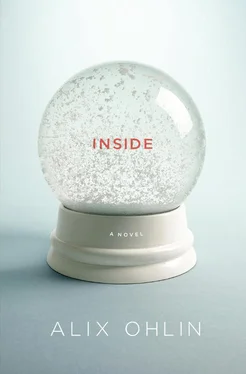It was Morris she thought of when she saw John Tugwell again. Because she knew there was no good reason she should be so intensely interested in him; that he was a troubled person, one more likely to suck her into his trouble than to be drawn out of it. But when she saw him, the rush of gladness made her catch her breath. And none of the commonsense warnings she gave herself could counter that gladness and drag her back to earth.
Until that moment, she had told herself she was just looking for a birthday present for her friend Azra. That stopping into this stationery store in Westmount had nothing to do with the incident on the mountain. Then she saw him. He stood at the back of the store behind a counter, flipping through a book of wedding invitations with a couple. When she walked in, he glanced at her, but neither of them smiled or even nodded. Turning away, her heart thrumming, Grace browsed through some clothbound journals. In the background she could hear his voice patiently listing paper brands and prices.
Another clerk, a woman with bleached-blond hair, said, “Est-ce que je peux vous aider?” and Grace shook her head. She must have uncapped a hundred pens and flipped through every birthday card before she finally picked one out and bought a journal as her gift. He was still waiting on the bridal couple, the woman unable to make up her mind.
“I think I should ask my mom what she thinks,” she was saying.
“She’ll like whatever you like,” her fiancé said.
“But she usually helps me figure out what I like,” she said.
The blond woman, who was ringing up Grace’s purchase, met her eyes and smirked. “I give them a year,” she muttered.
Grace nodded mechanically, taking the bag. As she was turning to go, the couple thanked Tug for his time and left.
“I’m not totally dependent or anything,” the woman said. “I just trust her judgment. It’s good to get a second opinion.”
“ I’m your second opinion,” her fiancé said.
Tug was smiling wryly, absently, as Grace walked toward him, trying to arrange her face in some semblance of casualness. She put her plastic bag on the counter and said, “I’m interested in some invitations.”
“Are you getting married?”
“No.”
“So what kind of event, then?”
“I’m just kind of interested,” she said, glancing over her shoulder at the other clerk. “In general.”
“Hypothetical invitations, right,” he said, and flipped open an album.
Leaning over it, their heads close together, she could feel the heat coming off him. “I was just wondering,” she said, “how you were.”
“I’m fine.”
“I don’t see any crutches.”
“I’m a quick healer,” he said. He saw her looking at his throat, whose redness might have been mistaken for a rash, and flushed.
“And otherwise?” she said.
“I’m great,” he said. “Never better.”
“You don’t have to be flip with me,” she said evenly. “I’m not judging you or asking you for anything. I’m just concerned.”
“Why?” he said, sounding more curious than angry. “It’s not every day that I meet someone so … invested in my well-being.”
Grace looked up, holding his gaze. “It’s not every day that I meet someone the way I met you.”
“I’m sorry about dragging you into my life,” he said. “It’s not what I meant to have happen.”
“I don’t mind it,” she said.
She slipped a sample of expensive bonded paper out of the album he held. With one of the store’s fancy pens she wrote down her name, address, and phone number. “This is who I am,” she said. “You can call me, if you want to.”
“What if I don’t want to?” he said. “Will you leave me alone?”
Grace was taken aback. “I don’t know,” she said.
Another smile broke over him then, composed of equal parts surprise, cynicism, and amusement, and he looked like a different person, younger, sweeter. She realized he was handsome. He had a beautiful smile, with even white teeth and a dimple on the left side. “You’re something else,” he said. “I’m just not sure what.”
She smiled back, and then the blond clerk cleared her throat, indicating the presence of other customers, so she gathered her purchases and left.
Of course he didn’t call. She didn’t expect him to. They were strangers. So she tried her best to forget about him, the day on the mountain, the unexpected sweetness of his smile. But in still moments, when she was driving home, or folding laundry, or in the shower, images would flicker in her mind. Not memories, but images of what she hadn’t seen: Tug skiing by himself into the woods. Tying the rope around his neck. His body falling, heavy but soundless, into the snow. Waiting for her to come skiing down from the Chalet. Waiting to be found.
An idea came to her with the weather. She woke up on a Saturday morning to find the world softened with snow. Outside people were shoveling out their cars, the trucks rumbling through the streets, plowing and salting. Her neighbor, Mr. Diallou, cleared a path around his Honda only to see a truck banking snow around it, obstructing him again. He raised his fist and cursed the driver. Grace smiled, knowing what to do.
She called the stationery store and asked for him. When the manager said he wasn’t working, she cleared her car, loaded it up, and drove to his apartment. It wasn’t yet ten o’clock. He came to the door wearing a thick gray sweater and jeans, apparently still half asleep, his eyes heavy-lidded, his clothes rumpled.
“Let’s go skiing,” she said.
Tug looked at her with no trace of the cynical distance she’d seen in him before. Maybe she had caught him at an unguarded moment. “Do you want some coffee?” he said.
She followed him inside and took off her boots in the hall, wondering if he hadn’t heard what she said. She unzipped her ski jacket as he poured her a cup of coffee from a full pot. On the table was his own cup, the newspaper, a plate with crumbs. He was rubbing his hair absentmindedly, the loose curls spreading around his head, the lines around his eyes deeper than usual.
“Milk? Sugar?”
She shook her head. He gestured at the chair across from his, and she sat down. With what she understood to be a welcoming gesture, he pushed a section of the newspaper in her direction. It was the Business section, and she read through it carefully while sipping the coffee, as if she might be tested on it later. Laurentian Bank’s revenues had increased. Four people had died in an accident in a diamond mine in Botswana. Tug yawned, flipping the pages and shaking his head over some article or another.
Fifteen minutes passed. There was no sign of the dog, and she wondered if his ex-wife had come by to pick it up. If he’d told her what he had done on the mountain, or had tried to do.
He rubbed his hair again, tousling it even further. Then he said, “I’m never much good before coffee. When I used to travel a lot, I always took a coffee kit with me. People would make fun of me, and it used to drive Marcie crazy. She’d sit across from me and tell me all her dreams, and then the entire plan for the day, and think everything was settled. Half an hour later I’d go, ‘Were you saying something?’ ”
It was his first unprompted confidence, and she didn’t speak, not wanting to startle or interrupt him. She only nodded.
“No wonder she left me,” he said, without apparent rancor.
She smiled at him, encouraging him to go on, and his eyes focused on her face, then on her clothes.
“Were you saying something?”
“I thought we could go skiing.”
As if this were the first he’d heard of it, he looked out the living-room window at the snow. “I never pay attention to the weather,” he said softly, seemingly to himself. “What’s wrong with me?”
Читать дальше












